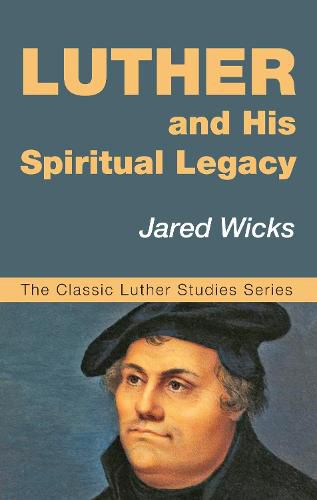Readings Newsletter
Become a Readings Member to make your shopping experience even easier.
Sign in or sign up for free!
You’re not far away from qualifying for FREE standard shipping within Australia
You’ve qualified for FREE standard shipping within Australia
The cart is loading…






This title is printed to order. This book may have been self-published. If so, we cannot guarantee the quality of the content. In the main most books will have gone through the editing process however some may not. We therefore suggest that you be aware of this before ordering this book. If in doubt check either the author or publisher’s details as we are unable to accept any returns unless they are faulty. Please contact us if you have any questions.
Luther can be a forceful teacher of lived religion. He can be a resource for the enrichment of personal spirituality for members of all Christian confessions. Above all, Luther sought to help people be struck personally by the word and work of Christ. So writes Jared Wicks in Luther and His Spiritual Legacy, a work full of citations of Luther’s teaching that shows the Reformer treating major issues of Christian living that focus on conversion from self-reliance to trusting God’s word of grace. After a concise survey of the world in 1500, Luther’s theology of the cross emerges from his interpretation of Psalms and Romans. Once the Reformation reached an initial settlement, Luther produced attractive catechisms to counter ignorance of the Christian basics among the people and their pastors. Luther’s many-sided controversial arguments–with Catholic opponents, the Reformation radicals, Erasmus, and Zwingli–were efforts to ward off misconceptions of the central dynamics of Christian conversion. But Luther’s later constructive works offer a well-rounded account of life in Christ–characteristically marked by personal certainty ever renewed from God’s address, by eruptive spontaneity in doing good, and by dutiful service in one’s vocation.
$9.00 standard shipping within Australia
FREE standard shipping within Australia for orders over $100.00
Express & International shipping calculated at checkout
This title is printed to order. This book may have been self-published. If so, we cannot guarantee the quality of the content. In the main most books will have gone through the editing process however some may not. We therefore suggest that you be aware of this before ordering this book. If in doubt check either the author or publisher’s details as we are unable to accept any returns unless they are faulty. Please contact us if you have any questions.
Luther can be a forceful teacher of lived religion. He can be a resource for the enrichment of personal spirituality for members of all Christian confessions. Above all, Luther sought to help people be struck personally by the word and work of Christ. So writes Jared Wicks in Luther and His Spiritual Legacy, a work full of citations of Luther’s teaching that shows the Reformer treating major issues of Christian living that focus on conversion from self-reliance to trusting God’s word of grace. After a concise survey of the world in 1500, Luther’s theology of the cross emerges from his interpretation of Psalms and Romans. Once the Reformation reached an initial settlement, Luther produced attractive catechisms to counter ignorance of the Christian basics among the people and their pastors. Luther’s many-sided controversial arguments–with Catholic opponents, the Reformation radicals, Erasmus, and Zwingli–were efforts to ward off misconceptions of the central dynamics of Christian conversion. But Luther’s later constructive works offer a well-rounded account of life in Christ–characteristically marked by personal certainty ever renewed from God’s address, by eruptive spontaneity in doing good, and by dutiful service in one’s vocation.